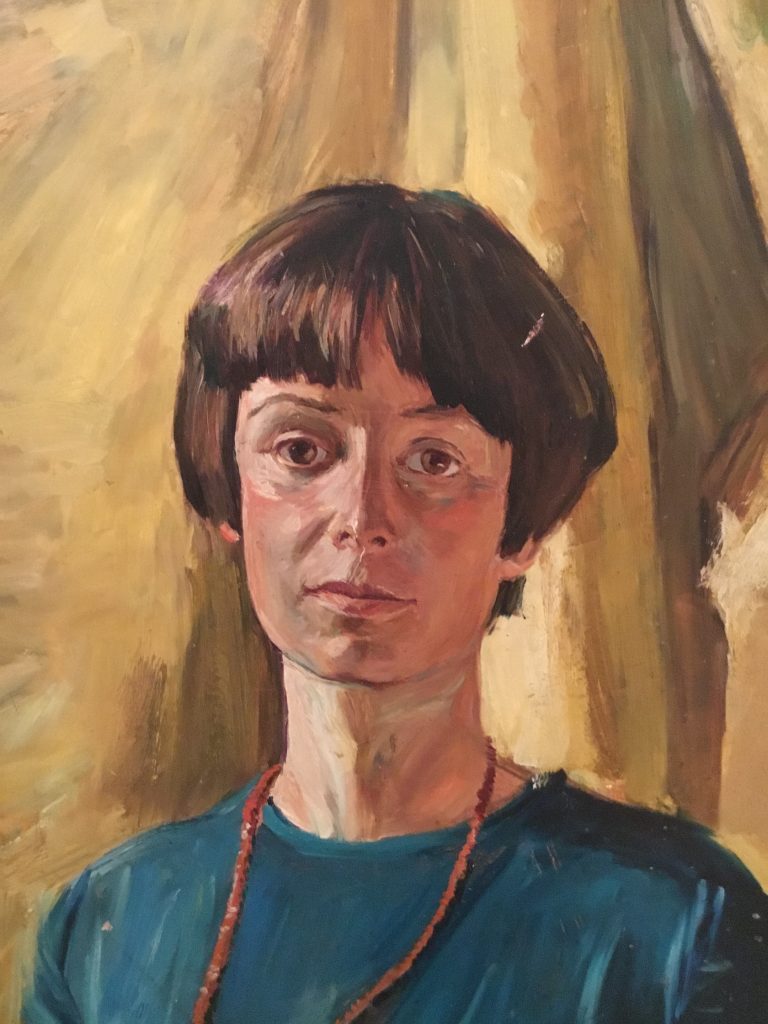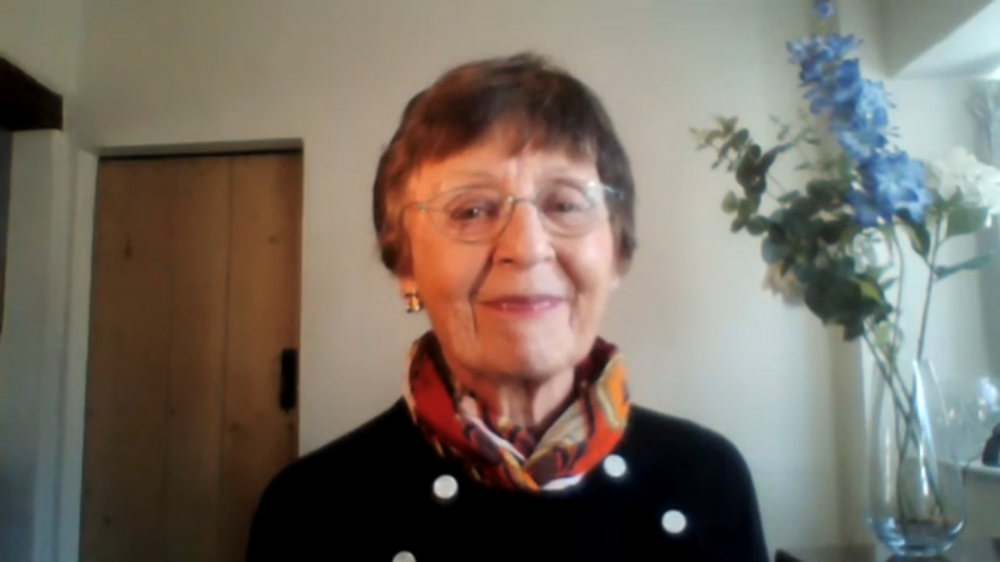Introduction by Clare Westmacott

The Diary
My grandmother Klara Mehlich wrote this diary from December 1940 to November 1944 while living in and around Cologne. She wrote them for my mother who was married to an Englishman Jack (my father) and living in England. They are an account of her life during the war years and my grandmother hoped that if she were unable to give them to my mother herself, that they might somehow reach my mother one day. They both survived the war and eventually the diary was given to me.
My grandmother came from a colourful background. She was born in 1889, the daughter of a farmer’s daughter who – as family lore has it – ran off with a bare-back rider when the circus came to town. As a child my grandmother travelled extensively to cities all over Europe including Saint Petersburg and London. They were a large family and she lost several brothers in the First World War.
She was a lot younger than her husband. He was an artist and Professor of Art in Cologne and she had been one of his models. He was born in 1874 in Cologne the son of a sculptor who came from the Saarland to work on finishing the cathedral. My grandfather’s first lessons were from his father and between 1897 and 1908 he was the pupil of Eduard von Gebhardt at the Dusseldorf Academy and master pupil of Peter Janssens. As a student he travelled to study in Berlin, Munich, to the world exhibition in Paris (1900), to Belgium, Holland and Italy. The Italian trip was the result of winning a prize to study there for a year.
His province was the painting of historical, religious and monumental works and his work was displayed in several cities in Germany including Berlin. One of his early murals painted in 1902 was a ceiling painting „Prometheus brings the heavenly fire, the truth of art and the light of perception to humanity“ for the opera house in Cologne. He was responsible for large murals in many churches and secular buildings, one example being a mural in the treasury hall of the Nassauer Landesbank in Wiesbaden painted in 1915. He was a highly regarded portrait painter and belonged to a circle of artists known as „Der Stil“.
He was appointed as a teacher to the Cologne arts and crafts college school in either 1912 or 1914 and became Professor at that institution in 1923. He retired in 1936. Many of his paintings were destroyed in the War including the ceiling painting from the opera house but some exist in museums in Cologne and some religious works went to the USA and some are in private hands.
My grandparents had three children, my mother Liese Lotte born in 1912, Walter who was four years younger and Robert (called Röbi) who was born in 1920. They were comfortably off, although somewhat Bohemian and lived in an elegant house in the Wiethasestrasse in the district of Braunsfeld in Cologne. They moved in fairly elevated circles and were members of the best social clubs before the war. Among their circle was Konrad Adenauer who was Lord Mayor of Cologne and who was dismissed from the post by the Nazis in 1933. After the war he became the first Chancellor of the Federal Republic of Germany.
The children had a governess until they went away to school, my mother to a convent school and Walter was sent to the Jesuits. Röbi went to the local school.
My mother came to England in 1936 to be an au pair. She met my father and married him in a civil ceremony in 1937 by special licence before she had to return to Germany shortly before her visa ran out. It was then easier for her as a married woman to return to England permanently in March 1938 when they married in church and my grandmother gave her away at the wedding. My parents visited the family in Cologne in summer 1938. My mother became a naturalised Briton upon marriage and was therefore not subject to internment. I was born in 1940 (Klaerchen in the diary) and my brother Nigel was born in 1943.
It is clear what my grandmother’s political views were during the war and this diary must have been written secretly, and to judge by her handwriting sometimes in great haste. In fact she was once summoned to the Gestapo over a letter she had received and she also records in the diary the illegal activities she did undertake.
They are a very personal account of her life during this period reflecting the experiences of a housewife desperate to find food for her family, of a citizen enduring the privations of the war without compromising her principles, but above all of a mother whose desire for the safe return of her children was paramount, all within the context of the horrors of the war. At first she seems to have some difficulty getting her diary up and running but it soon becomes apparent that her digressions are both relevant and interesting.
Her diary reveals inconsistencies in her relationship both with her children and her husband which in respect of her children at least can only have been as a result of the stresses of the war. For example although the diary is dedicated to my mother she not infrequently imagines my mother is not even trying to keep in touch. Her relationship with her son Walter fluctuates from being very close and loving to indifference. Only Röbi escapes criticism.
As for her relationship with her husband, clearly it had broken down long before the war started but the shared love and concern for their children retained by a thread the bond that had once existed between them.
Her relationship with God was also very personal and not without humour. Her faith faltered on occasions but on the whole she believed that if God willed it her children would be returned to her.
There are also inconsistencies of fact in her diary but one can only assume that she wrote down what she believed to be true. For example although she clearly was suspicious of Nazi propaganda she nevertheless believed a report that York Minster had been destroyed by the Luftwaffe.
With the benefit of hindsight it is fascinating to read her accounts of events in relation to what we now know to be the facts. For example her account of what happened on the night of May 30 1942 was actually the first thousand-bomber raid on Cologne, indeed the first thousand-bomber raid of the war. Then there is her observation that the Jews had to start to wear the star of David badges. „What good is that going to do? It can only cause bad feeling even among decent people. People shake their heads in disbelief as they walk by.“
Although I thought I knew my grandmother well and loved her dearly, as a child it never occurred to me that she never spoke about the war (she was more interested in showing me the beauties of the countryside or taking me to museums and art galleries).
I went to Germany for the first time in 1948 at the age of seven and I will never forget the sight of Cologne on that first visit. There was destruction everywhere and little bunches of flowers left in remembrance on the heaps of stones. My grandmother was in hospital in Bensberg in the Bergische Land being treated for her heart problem with leeches. Something else I will never forget is the sight of a jar of them sitting on the window sill above her bed! Later at every opportunity my mother and grandmother sat talking and talking for hours on end.
Now I have at last worked my way through the diary I admire her stoicism, integrity and courage throughout a ghastly period of history and feel I know her much better than I did before.
Goethe wrote, „I have often felt a bitter sorrow at the thought of the German people, which is so estimable in the individual and so wretched in the generality“. I believe that this statement was never more true than in this diary.

Clare Westmacott remebers her first visit in Germany in 1948 and shares her impressions in videos she produced for an online seminar of the Cologne City Museum on International Women’s Day 2021.
